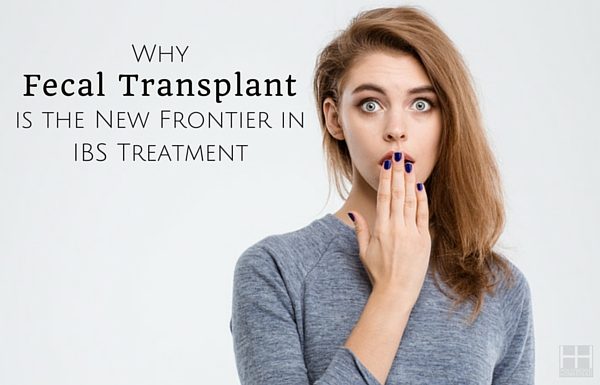
As I talk about in my post about gut flora, the bacteria in our gut plays a very important role in our overall health. We now know that many diseases, ranging from autism to obesity to GI problems like IBS, are linked to unbalanced gut bacteria.
In short, resetting your gut bacteria is super beneficial when reversing certain diseases.
The fastest and easiest way of resetting your gut bacteria is proving to be fecal microbiota transplants.
What is a Fecal Microbiota Transplant?
Also known as fecal bacteriotherapy (FBT), a fecal transplant is exactly what it sounds like: you take a sample of feces from a healthy subject and put it into an unhealthy recipient. The feces can be administered through an enema, colonoscope, through freeze-dried capsules which are swallowed, or a tube which is inserted through the mouth and into gut.
Even though western medicine is only now finding out about the benefits of FBT, the practice has actually been around for a long time. Medical literature from 4th century China talks about a remedy for food poisoning which involved drinking a “soup” made from feces and water. Bedouins (nomadic tribes in the Middle East) would consume camel feces to treat bacterial dysentery. In WWII, German soldiers tried this cure and established its efficacy. (Source)
Does It Work?
Right now, FTB is mostly recommended as a last-resort therapy for clostridium difficile infections which did not respond to antibiotics. More than 90% of patients who receive a stool transplant for this infection are completely cured. The reason that the method is so effective is because, unlike antibiotics which only destroy bacteria, FTB also recolonizes the gut with good bacteria needed to reestablish balance. (Source)
Studies into FTB for IBD are also promising. One study, for example, found that 78% of patients with ulcerative colitis had benefits in just 1 week and only 33% of patients experienced remission. (Source)
As for IBS specifically, there have been very few studies, and no large-scaled studies. Still, you shouldn’t dismiss the idea of a fecal transplant as a cure just yet.
One study which involved 13 subjects who had IBS for an average time of 73 years found significant improvements after fecal transplant. In 70% of the subjects, the IBS symptoms resolved completely or were significantly improved.
In a study with 55 patients with IBS and IBD, 36% of the subjects had a complete cure and 16% of them had reduced symptoms. In another study with 45 patients with chronic constipation, 89% of them had relief after fecal transplant. (Source)
It makes sense that fecal transplants would be much more effective than the other methods like probiotics for IBS. A probiotic supplement only contains a few strains of bacteria or yeast. As Dr. Axe points out, a healthy stool contains over 1,000 strains of microbes and hundreds of trillions of units. Getting a transplant of stool is a much faster way of repopulating your gut with the organisms it needs for balance. It is also much more efficient since modern methods allow the organisms to get to the colon directly rather than having to go through the stomach where they can be destroyed by stomach acid.
Since gut bacteria is so important for all of our everyday functioning, it shouldn’t be surprising that fecal transplants are also being explored and showing promise for treating non-GI disorders such as diabetes, multiple sclerosis, Parkinson’s disease, obesity, and more.
Where to Get a Fecal Transplant
As of 2013, the FDA has classified fecal microbiota transplant as an “investigational new drug.” It is only permitted to be used on cases of C. difficile infection which did not respond to multiple courses of antibiotics. Canada has taken the same stance as the United States. This means that, if you live in the USA or Canada, you cannot get a fecal transplant for IBS! In the UK, Australia, Europe, and some other nations though, you can get a fecal transplant therapy legally from your doctor.
What should you do if you live in the USA or Canada and want to try fecal transplant for IBS?
One option is to see if there are any clinical trials for fecal transplant and IBS open. You can go to clinicaltrials.gov to check.
Another option is to give yourself a fecal transplant at home. You can ask your doctor for instructions on how to do this, and your doctor may even test your donor sample for you. Don’t go giving yourself a donor feces enema without testing the sample first though! While there aren’t any known side effects associated with fecal transplants, there is no reason to take risks. Talk to your doctor first!
Have you ever considered a fecal transplant? Would love to hear your thoughts in the comments below!
Do you have IBS? Download our free guide 7 Things You Wish Your Doctor Told You About IBS.

Latest posts by Sylvie McCracken (see all)
- Treating H. Pylori (Part 3): What H. Pylori Does to the Body - August 8, 2022
- Treating H. Pylori (Part 2): How H. Pylori is Contracted - August 3, 2022
- Understanding Beef Labels: Organic, Pastured, Grass-Fed & Grain-Finished - July 25, 2022

This article is concerned with the microbes residing in one particular niche: the small intestine of the digestive tract. Although most of the human flora (the term used for the bacteria living in the human body) is found in the colon, there are a good number of microbes found in the small intestine.
I would love further insights on SIBO cure with FMT.
Ashley…you are RIGHT on. this protocol is to help rebalance the flora in your large intestine. We aren’t supposed to have overgrowth of bacteria AT ALL in our small intestine. This is not a protocol for SIBO if I understand that correctly.
An osteopath suggested trying homemade suppositories made with coconut oil and a probiotic like VSL#3. Not sure it is helping as I am on alot of other stuff.
Is there a specific doctor you ask about this?
I thought fecal transplants don’t work for SIBO because the cause of SIBO is bacteria in the small intestine. A transplant does not get bacteria into the small intestine, and even if it did, there should not be bacteria in there anyway so it would not help. I’m interested in hearing what others have to say about it though! If it worked I would try it!
so happy you’re covering this! i’ve been interested in this for a long time, but never felt i could trust my doctor enough to ask. i’d love to hear from anyone who has done it!